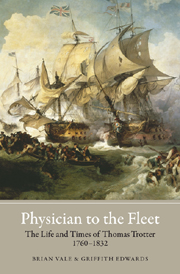Preface
Published online by Cambridge University Press: 12 September 2012
Summary
VISIT THE CAIRD LIBRARY of the Maritime Museum at Greenwich and the atmosphere is all hushed and quiet with a few scholars sitting at their desks and going through papers. It is not a place to welcome much excitement. Ask for your wanted file and there will be some delay before a mute librarian delivers it to your hand.
So our requested file has been placed before us and we undo its tapes to liberate the contents. Excitement? Here is a letter dated 7 January 1803 in the handwriting of Horatio Nelson, thanking the correspondent for care of an infected eye. A letter dated 18 April 1801 falls open that bears the signature of Edward Jenner, the discoverer of vaccination and heroic benefactor of all mankind: a gift of vaccine had originally been included. Look a little further and we find a note from the famous abolitionist William Wilberforce, acknowledging his correspondent's contribution to the anti-slavery cause. The person to whom each of these letters was written was Dr Thomas Trotter MD, Scottish baker's son made good, sometime Physician to the Fleet, author of various seminal texts, and a mover and shaker of his times. That slim file has echoes of cannon shot and awful naval engagements with young Trotter as a surgeon's mate while still in his teens. The letters bear witness to a life of high endeavour, but not a cough or murmur is heard in the library.
- Type
- Chapter
- Information
- Physician to the FleetThe Life and Times of Thomas Trotter, 1760–1832, pp. xi - xiiPublisher: Boydell & BrewerPrint publication year: 2011



